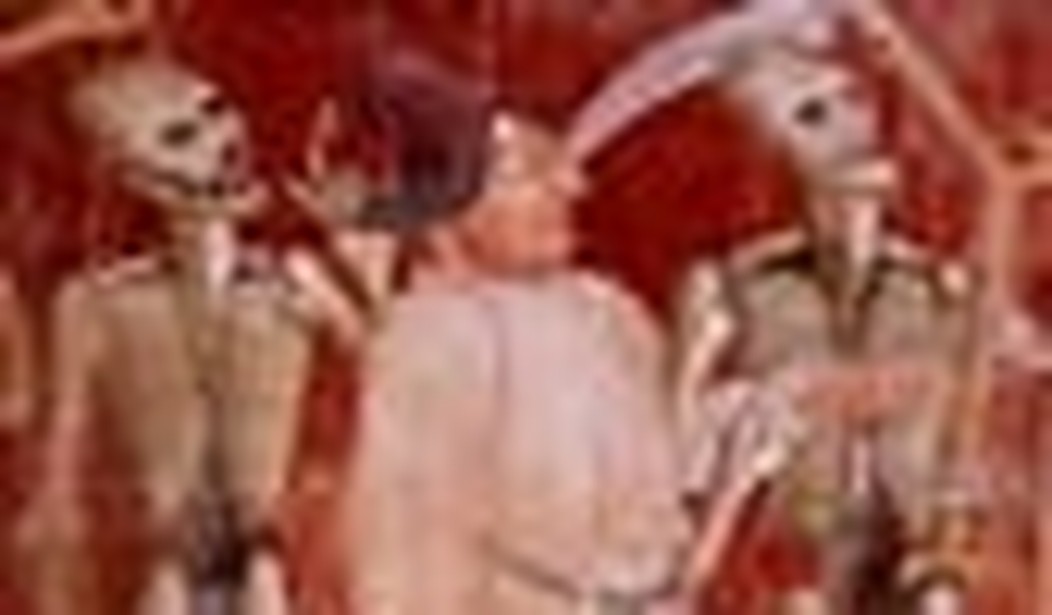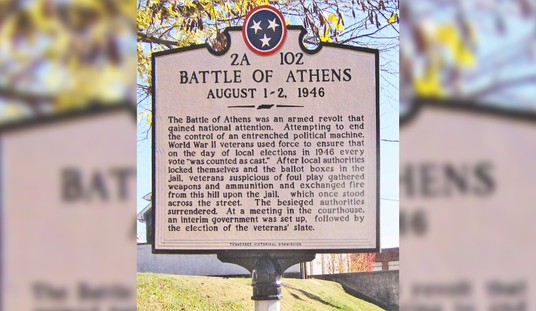Barring yet another unexpected twist in the plot over the next nine months, the American electorate has a choice of three candidates for president. All are flawed. The presidential campaign between now and Election Day will be devoted to exposing and highlighting these failings. For those inclined to televised news networks, long evenings beckon, filled with an endless loop of “political observers” repeating their penetrating insights into the obvious from now till November 6th.
The campaign for the presidency of 2012 is best understood not by the pundits of today but by a drama written in 1485.
In that year, 527 years ago, a new production opened in England. Entitled Everyman, this morality play became an instant hit, and has enjoyed remarkable staying power — and relevance — to this day.
The plot is easily summarized: in an age of the bubonic plague and other pandemics, God is troubled by how mankind has forsaken Him and has become immersed in frivolity. He sends his messenger, Death, to summon Everyman who, like most of us, is afraid to meet his Maker. He’s certain his spiritual balance sheet isn’t ready to be tallied by God. He hasn’t lived the life he knows he should have and doesn’t want to be judged just yet. He wants more time to get his moral books in order — as who among us doesn’t?
He’s been seduced by the three greatest temptations known to humanity: the world, the flesh, and the Devil. He argues with Death and is granted a single wish: he may bring one friend with him to speak on his behalf when he meets with God on judgment day — for the presidential candidates, November 6, 2012. The play shows Everyman turning to his dearest companions, Fellowship, Kindred, Goods, Beauty, Strength, Discretion, and Five Wits (the five senses), all of whom forsake him. Only one character agrees to die with him and speak well of him as his advocate after his death when Everyman comes face to face with his Maker.
Everyman lives within us all, including those seeking the presidency.
Any of their weaknesses could prevent their entry into heaven — for the candidates, defined as 1600 Pennsylvania Avenue, Washington, D.C. The gatekeeper is the Electoral College, which requires 270 votes for admission through the pearly gates into the heavenly realm, the Oval Office.
Alas, each candidate, like Everyman, has been sorely tempted in his life, and, as much as he wishes it were otherwise, his capitulation to his own greatest temptation is now clear for all voters to see. Taking the great temptations of each candidate one by one, we begin with
THE TEMPTATION OF THE WORLD
Mitt Romney has been tempted by the World, the medieval reference to Mammon, the ancient Sumerian god of wealth. Christians began to use Mammon as a pejorative, a term that was used to describe a desire for worldly gain, described as a false god in Matthew 6:24 and Luke 16:13.
Romney correctly states that in the country in which we live, the free enterprise system encourages free markets with as little government regulation as possible. He says — and hundreds of millions of people the world over agree — that this is one of the glories of capitalism and that “wealth is good.” In his concession speech to his supporters in South Carolina, he said that the 2012 election is a “battle for the soul of America” and he vowed to balance the federal budget. He decried both Obama’s and, without mentioning his name, Newt Gingrich’s “assault on free enterprise,” saying that, “when my opponents attack me and free enterprise, they’re attacking you. I’m passionate for our free enterprise system. Our party is the party of free enterprise, free markets and free consumer choice.
“The Republican Party doesn’t demonize prosperity,” he continued. “We celebrate success in our party.”
While Romney doesn’t have the sinister affect of Wall Street‘s Gordon Gekko — he doesn’t publicly snarl, bellow, or, heaven knows, swear — he certainly epitomizes — in part, the medieval concept of the man clearly focused on — and rejoicing in– the world and the riches to be reaped therefrom. While I do not criticize his business acumen and success — far from it — it was striking that at a time when “income inequality” is, no matter how absurdly or erroneously, much bruited, the on-message Romney made no mention of private charity as did George H.W. Bush with his “thousand points of light.”
Romney made it sound as if anyone who works as hard as he has will be similarly rewarded. Coal miners and plumbers work hard and are not similarly rewarded. This is true of many industrious Americans. Personally, I don’t oppose economic disparities, which would make as much sense as opposing clouds, oxygen and sunsets. But it might have made him a more sympathetic candidate for the presidency if he had, while celebrating the wonders of free markets and his own successful participation in them, at least expressed empathy for those who have worked every bit as hard as he has, yet have so much less to show for their efforts.
THE TEMPTATION OF THE FLESH
Tempted at 16 by his 23 year-old geometry teacher who became his first wife three years later when he was 19 and she 26, Newt Gingrich was re-tempted by Marianne Ginther, whose vindictive revelations were tawdrily broadcast by ABC “News” two nights before the South Carolina primary — to no discernible negative effect there. After 18 years of marriage to her, he married his current wife, Callista, with whom he had an affair during the final six years of his marriage to Marianne. Whether there were others will be a matter for Obama’s henchmen and operatives to uncover. If none can be found, they will be fabricated and paid for, as was the fate of Herman Cain, in my view.
Speaking of his serial temptations, Gingrich has said,
There’s no question at times of my life, partially driven by how passionately I felt about this country, that I worked far too hard and things happened in my life that were not appropriate. And what I can tell you is that when I did things that were wrong, I wasn’t trapped in situation ethics, I was doing things that were wrong, and yet, I was doing them. I found that I felt compelled to seek God’s forgiveness. Not God’s understanding, but God’s forgiveness. I do believe in a forgiving God. And I think most people, deep down in their hearts hope there’s a forgiving God.
Somebody once said that when we’re young, we seek justice, but as we get older, we seek mercy. There’s something to that, I think. I feel that I’m now 67. I’m a grandfather. I have two wonderful grandchildren. I have two wonderful daughters and two great sons-in-law. Callista and I have a great marriage. I think that I’ve learned an immense amount.
And I do feel, in that sense, that God has given me, has blessed me with an opportunity as a person. Forget about all this political stuff. As a person, I’ve had the opportunity to have a wonderful life, to find myself now, truly enjoying the depths of my life in ways that I never dreamed it was possible to have a life that was that nice.
Unlike the Iowans for Christian Leadership in Government, whose very name suggests their intolerance, 40 percent of South Carolinians were willing to accept Newt’s penitence and give him their votes. It wasn’t as if he was tempted by Satan himself.
THE TEMPTATION OF THE DEVIL
In this year’s morality play, which candidate would personify a man successfully seduced by the Devil? Why, none other than Barack Obama. He’s a walking compendium of the seven deadly sins — greed, wrath (such as when he snapped at Senator John McCain at a health care conference on February 25, 2010: “We aren’t campaigning any more. The election is over”), sloth (90 rounds of golf, the equivalent of three full months of his three-year presidency, while the country goes down the tubes), pride, lust (for power), envy (of the “one percent”) and gluttony.
There are more, although they don’t make the top seven: condescension, grandiosity (“Because if we are willing to work for it, and fight for it, and believe in it, then I am absolutely certain that generations from now, we will be able to look back and tell our children that this was the moment … when the rise of the oceans began to slow and our planet began to heal”), despicable, underhanded lowball tactics toward candidates seeking the offices he sought, inability to master his own addictions, ostentation, and unconscionable rudeness, egregious choice of friends, of the chief law enforcement officer of the country, and of his mentor, in whose church he claims he managed to ignore the anti-American rants that drove Oprah Winfrey from its pews.
THE CONCLUSION OF THE MORALITY PLAY
In Everyman, the protagonist attempts to persuade others to accompany him on his journey to the grave, but all forsake him but one: the character known as Good Deeds. Everyman wails,
“O all thing faileth, save God alone;
Beauty, Strength, and Discretion;
For when Death bloweth his blast,
They all run from me full fast.”
Beauty, strength, discretion, and the five senses can, indeed, diminish over time: all that remains at the end of our lives are our good deeds, represented in the play by the character of that name. Finally, at peace with himself, Everyman dies with no one but Good Deeds to speak for the life he led when he meets his Maker. That is the message of the play.
Which of our Everyman candidates will ascend to the presidency a year from today on Inauguration Day? All are human. All could stumble and fall under the weighty baggage of their humanity.
As George Clooney’s character asks in Up In the Air, “Whose backpack is the lightest?”









Join the conversation as a VIP Member